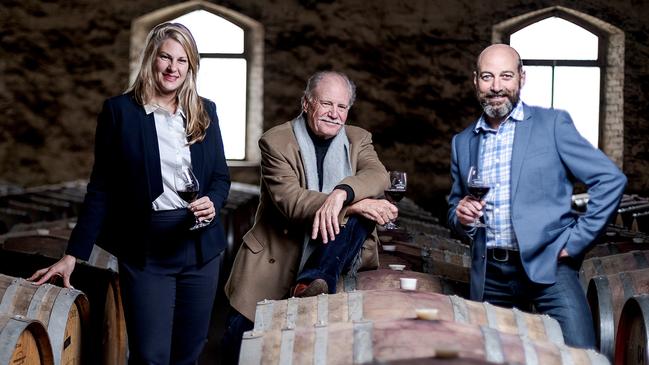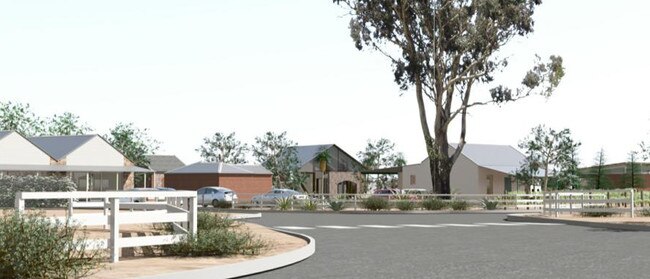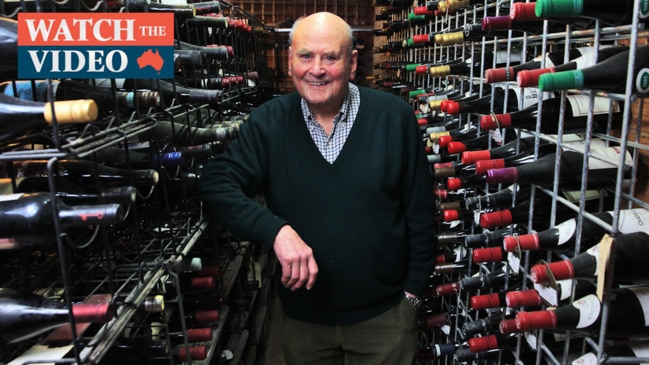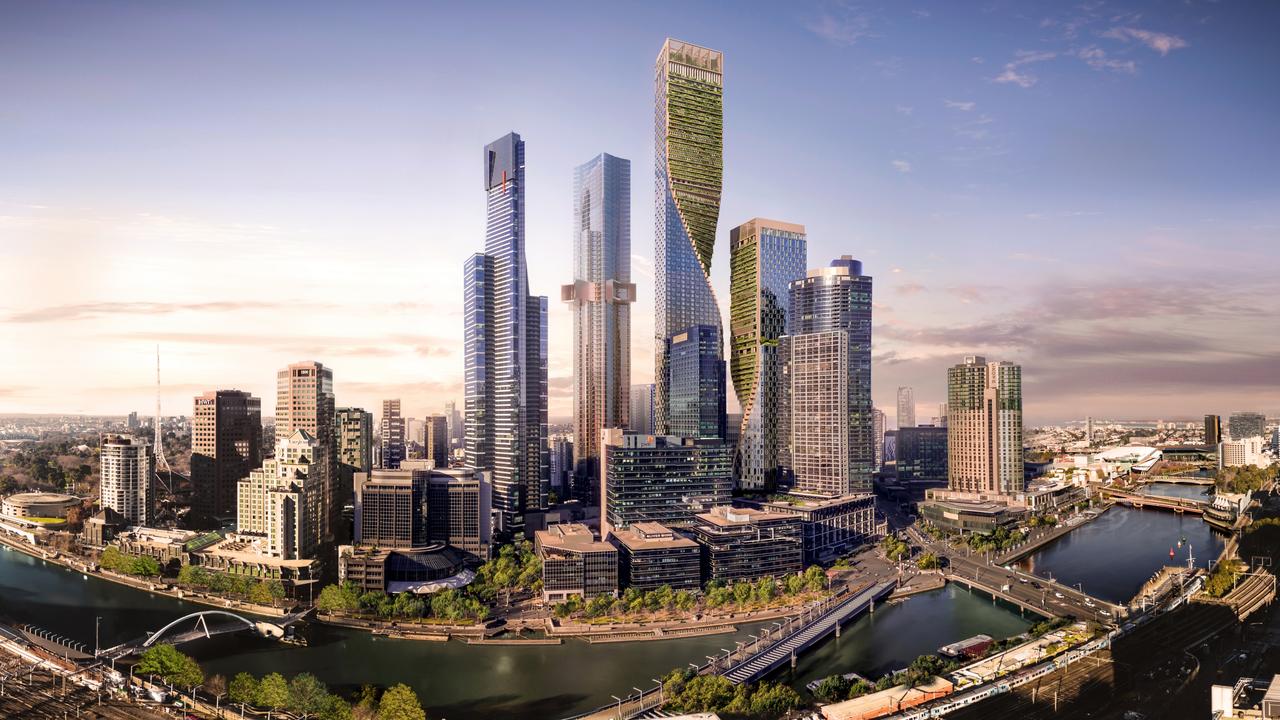Chateau Tanunda owner takes fight for the character of the Barossa to the courts
Chateau Tanunda owner John Geber says he’s taking a stand by opposing a $25m hotel in the Barossa, and it’s not because he wants to build his own hotel.

Business
Don't miss out on the headlines from Business. Followed categories will be added to My News.
Chateau Tanunda owner John Geber is trying to block the construction of a $25m five star hotel and tourism destination in Tanunda, two years after proposing his own five star hotel plan.
But Mr Geber says his fight is about preserving the character of one of the great wine regions of the world, rather than any self-interest, and he’s glad to take on the fight on behalf of the community.
Barossa Council last year approved a $25m project being developed by Barossa Central Pty Ltd, which will include 141 rooms, six luxury villas, a function centre, restaurant, shops, a gym, and an outdoor barbecue area.
But Mr Geber, through his companies Geber Super and Australian Food and Beverage Group, has lodged an action in the Supreme Court, seeking to have the approval for the project, at 252, Murray St, Tanunda, overturned.
Mr Geber’s companies are arguing that the development is “seriously at variance with the provisions of the (planning and design) code’’ arguing in part that the subject land was “not in an area that was appropriate for tourist accommodation of such a scale’’.

Mr Geber’s companies argue the development was not properly assessed against the desired outcome for new developments in a rural zone, which is the zoning for that piece of land.
The proposed hotel project is 2.9km from Chateau Tanunda, on the opposite side of the town.
But Mr Geber says his opposition has nothing to do with any plans he might have for his winery, which he points out, is zoned for tourism.
He said he was happy to cop the criticism from people who thought he might be opposing the hotel project out of self interest, but said they were wrong.
“If we carry on with the urban push .... we will just have another confounded suburban sprawl going right into the Barossa,’’ Mr Geber said.
“Our contention is we’ve forgotten the reason for being the Barossa. It’s about character preservation.

“There are five great wine regions of the world ... one is the Barossa and that’s why people come here. They’re not coming here to buy a frigging retirement home on a block of land.’’
Mr Geber said the project had been approved on the basis that it was a “variation’’ from the prevailing planing rules, but the floor space was in fact more than 60 times what was suggested for a rural zone.
“I’m fighting for the whole Barossa, I feel very strongly about it.
“The character and the rural component of the Valley are very important.’’
Mr Geber said California’s Napa Valley had faced similar issues 30 years ago and winemakers such as Robert Mondavi had fought the same battle.
In applying for development consent, the Barossa Central project’s planner John Outhred of Outhred English said it had the potential to attract a major international accommodation brand to the Barossa.

He said at the time construction of the complex would likely begin this year, pending planning approvals.
“It’s in such an ideal location, just outside Tanunda and central to the other major Barossa towns at Angaston and Nuriootpa, it will indirectly be a big boost for Tanunda,” he said.
Mr Geber agrees the region needs tourism accommodation, just not on this site.
In arguing in support of his own plans, which were predicated on a now-finalised land swap deal with the council, he said in 2020 that “The Barossa is really crying out for something like this”.
But he told News Corp Australia on Friday that he had only had “loose conversations’’ about the project and had no vested interest to protect.
His plans envisaged a hotel with 100-120 rooms over up to three storeys, and a cultural educational centre with another 40-45 rooms, teaching visitors about winemaking, local cuisine and the area’s history.
Mr Geber announced his plans while he was in the midst of a fight with the state government, which he said was standing in the way of the refurbishment of a defunct rail line to the Barossa, which Mr Geber wanted to use to run tourism trains.
Mr Geber, who owns the three-carriage former Barossa Wine Train, said at the time the government’s decision not to help facilitate his plans was “the biggest waste of an asset I’ve ever seen in my life’’.

Then-Transport Minister Stephan Knoll said at the time that an expressions of interest process for the rail line had delivered “no proposal that was feasible without a prohibitive amount of taxpayers’ dollars being required’’.
The court documents lodged by Mr Geber’s companies state that the panel in assessing the Barossa Central project took into account “irrelevant considerations’’ including that “there was a ‘perceived’ shortfall in 4-5 star tourist accommodation within the Barossa Valley’’.
It is argued that the planning code does not refer to 4-5 star accommodation in the Barossa or anywhere else, and “the respondent relied upon the existence of a supposedly supporting letter from Tourism SA despite no such letter being provided to the respondent ... and/or it being an irrelevant consideration’’.
It is not the first time in recent years a bid to build high-end hotel accommodation in the Barossa has met with resistance, with Seppeltsfield’s $50m “Oscar” hotel plans attracting a court bid to have that project reclassified to allow greater public consultation.
The Environment, Resources and Development Court ruled in July the six-star hotel had been correctly classified as a category two development by the Light Regional Council and did not meet the criteria for category three. A category two development means only immediate neighbours can lodge an objection and have 14 days to do so and no appeal rights.
A category three would mean anyone, anywhere in the state, could object and appeal rights are preserved.
That court action was dismissed in July last year and the approvals process for that revised version of the $50m, six-star project is ongoing.
Barossa Central’s Nick Paphitis declined to comment as the matter is before the courts.



